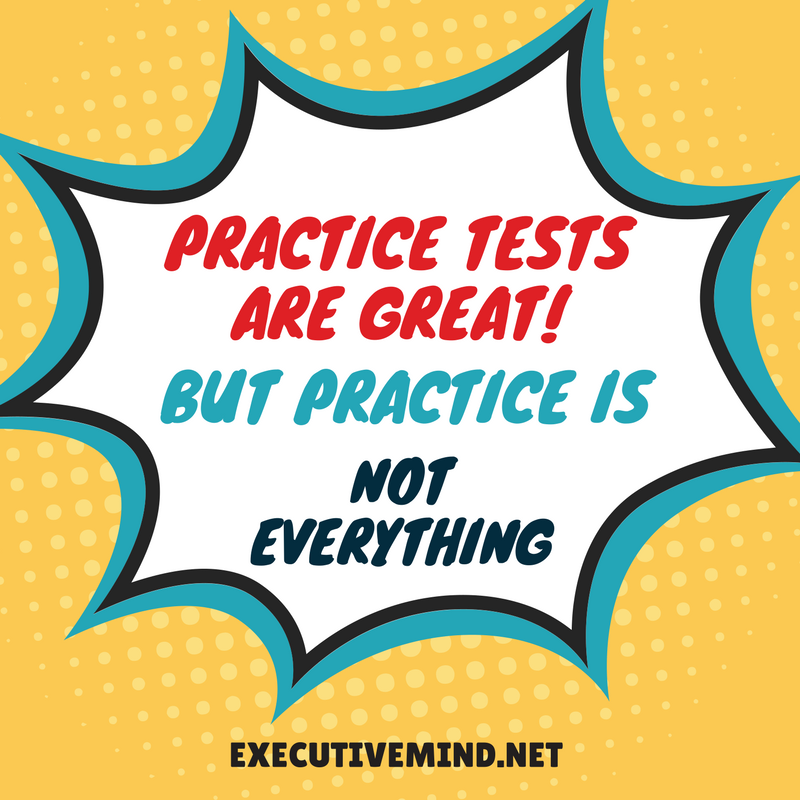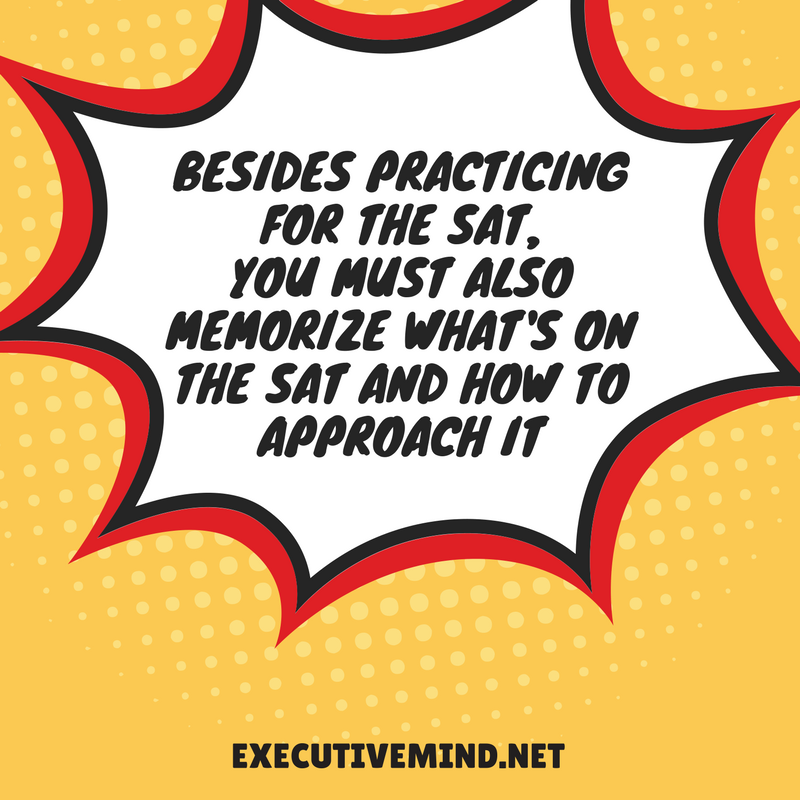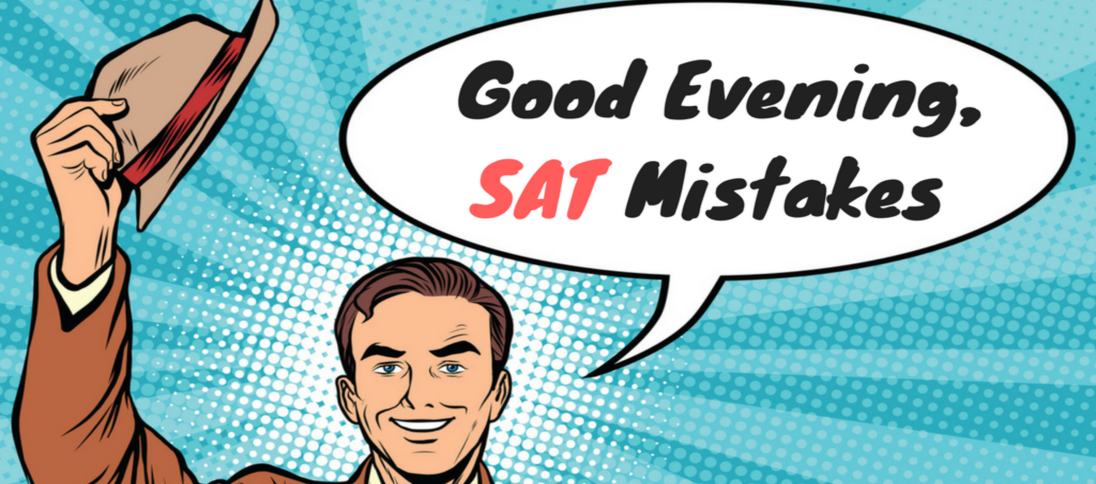Taking the SAT® is like shooting arrows while blindfolded.
Every attempt depends on your ability to hit an invisible target. Your tutor can be brilliant, and every condition might be perfect. But if you cannot hit what you can't see, your arrows won't hit your target. The SAT® is like almost any other test: you're not told if you got the right answer until after the examination. When you take the exam, you will be going in blind.
If you do anything, learn to cope with your blindness. You can't cheat. You can't bribe someone to give you the answer key. During the exam, all you can do is make an educated guess. But that doesn't mean that you should continue practicing without getting better. Just because you don't know the outcome doesn't mean that you shouldn't address how you're studying. If anything, how you study is something that you can control.

No, you cannot always control whether or not you become hospitalized because of a car accident. But you can normally control how you prepare for and act during the SAT® . For example, you can practice and memorize high-frequency English vocabulary words, allowing you to better understand the passages, answers, and questions that are presented during the exam.
You must also address your mistakes. Any mistake that you make can mean that you lose points. Normally, it doesn't matter how you came up with a right answer to a question. If you made a mistake, you could still get a complete score. However, one mistake is a slow descent into making more mistakes.
When you mistakenly tell yourself that false information is the correct information, you start to believe lies. When you start to believe lies, you may stop believing the truth. When you stop believing the truth, you may answer a question incorrectly. And unless the SAT® writers made a mistake while writing the exam — which is far and few between — you won't get a perfect score.
Moreover, what's to say that you'll stop there? If you continue telling yourself lies, you might not remember what's true and what's not true. That is exactly why you need to make sure that you address your mistakes before you take the SAT® . Any mental mistake you make can damage your final score. You need to test how you do on SAT® diagnostic exams before you attempt the real examination.
So, if you want to start addressing your mistakes, let's discuss how you do that.
First, 10% your time is devoted to practice. No one will tell you that practice doesn't make perfect. But that doesn't mean that practice is everything. If practice was everything, you would never study for an examination. You would only practice taking diagnostic exams. I'm not sure if you want to take an SAT® diagnostic exam every day before the actual exam. However, if taking a diagnostic exam every day improves your score, more power to you.

Receiving the right instruction and guidance will take up another 10% of your time. This is where studying and learning come into place. If you have a tutor or mentor who is helping you with the SAT® , that also applies to this 10%. Besides practicing for the SAT® , you must also memorize what's on the SAT® and how to approach it. It's what you're doing while you read through this article. You cannot try to practice what you don't know. You only try to practice what you've learned.

As for the next 20%, that will involve reviewing what happened after practicing and learning. You must keep your memory fresh by memorizing what you just learned. You need to take time to let things sink in, allowing your mind to soak everything in. Just because something went in the first time doesn't mean that it will stick or that everything will go in immediately. You need every bit of information that you can get. Moreover, you should practice memorization after you receive an instruction of any kind. If you learn something new about the SAT® , you should take time to memorize it.
Nonetheless, count anything that you fail to learn as a mistake. The SAT® doesn't offer grace for not knowing information. If you don't know the answer to one question, you effectually forfeit your chance for that point. You will shoot your arrow blindly, and you may miss your mark. If you learn something and it doesn't stick, it would be the equivalent to never learning it the first place. A lesson forgotten is a lesson never learned.

Otherwise, you need to spend 60% of your time reviewing and practicing what you've learned. Effectually, 80% of your time is spent reviewing what you know or have been practicing. However, only 20% of that time happens right after you learn something. The rest is what you do in your spare time. Your life will revolve around practice, practice, and more practice. You must also review what you learned.
Every weakness that you have must be destroyed. No false information. No ifs, ands, or buts. You must forget every lie. Settle for nothing but perfection.
And here's an odd fact: you normally don't automatically become successful while receiving instruction. Instruction is only the start of your success. You will get better while you practice.
Practice is where you take instruction and stick it to the test. You also test how well you learned. Someone who fails at a test is not necessarily someone who failed to practice; that person probably failed to listen to instruction or practiced while thinking what they were doing was right. They carried out the instruction incorrectly or chose not to listen. Practice can show how well you listen and carry out instruction.
You must also review what you have done and how you have been practicing. Sadly, reviewing what you've done isn't always fun. Reviewing what you've done can destroy your ego. Reviewing what you've done requires unsparing honesty. Reviewing what you've done shows your innate ability for human error.
That's exactly what makes it so beautiful. Review shows us how we have stumbled. Review shows us how we are broken. Review shows us how we have missed the mark. Everyone stumbles. Everyone falters. No one is perfect. If everyone was perfect, no one would need to take the SAT® . Everyone would be happy, there would be world peace, and we might have created donuts that decreased the size of our waistlines.
Sadly, that is not the case. We live in a chaotic realm where we believe lies and need teachers to guide our steps. Donuts contain calories. Our minds produce falsehoods as if they were in a decrepit state. Every day, we address the human condition or let it debilitate our very ability to function. We must address life as Churchill once said, "never give in, never give in, never, never, never, never-in nothing, great or small, large or petty - never give in except to convictions of honour and good sense."
Never is when you can give up.
So, in order to get better, you must learn to love review. Well, you don't need to learn to love reviewing yourself. You need to get used to being reviewed — whether by yourself or by someone who can help you. If you love reviewing yourself and do nothing about it, you gain nothing. But if you get used to reviewing yourself, and you act upon it, you can become successful.
Think about it this way. Two students attend the same high school. The first student is told that his mind may get him somewhere, but that he must start to do better in mathematics. In turn, the student hears what was said, but instead of acting upon it, he does nothing. The second student is starting to fail three of his classes. He is warned of this situation, and he takes the message to heart. In turn, he works hard. Once the grades are released, both students check their scores. The first student has passed most of his classes, but he must retake the mathematics course because he failed the course. As for the second student, he succeeded in all of his classes.
You should follow the second student's example. Though you may struggle, you should take time to review what you're doing. If you ignore a warning, you may not succeed.
Getting back on track, it's time that you learn a new acronym. The phrase you need to know is R.A.P. This 3-letter acronym has nothing to do with ravens knocking on your door or musical genres. Instead, this stands for Repeat, Apply, and Practice. You repeat the process. You apply what you've learned. You practice what you've learned. Effectually, this means reviewing what you have done and practicing what you've learned over and over again. Every time you take a diagnostic test, you review your score, internalize what you could have done better, and begin to practice again.
On your diagnostic exam, make sure that you take into account every question that you got wrong. Make sure that you take into account every question that you thought was weird. Make sure that you take into account every question that you struggled to answer. Any of these questions you must address while you study. And while you study, internalize every in-depth explanation for these questions. Memorize the explanations if you must.
Here's a quick checklist:
- Check why your answers were wrong.
- Check why your correct answers were right.
- Check why your right answers are not wrong.
- Find the difference between the right answer and wrong answers.
- Find out what grammar rules you should have known.
- Focus on sentences that have grammar errors.
- On math questions, check the right answer before looking at the explanation.
- Figure out how to get the right answer and why you failed.
- Complete the problem again
- Do this with every question that you deem necessary.
Then, it's time to make flashcards. On the front, jot down everything you need to find the question. On the back, write down the answer to that question and any relevant notes.
Now, it's your time to R.A.P.
